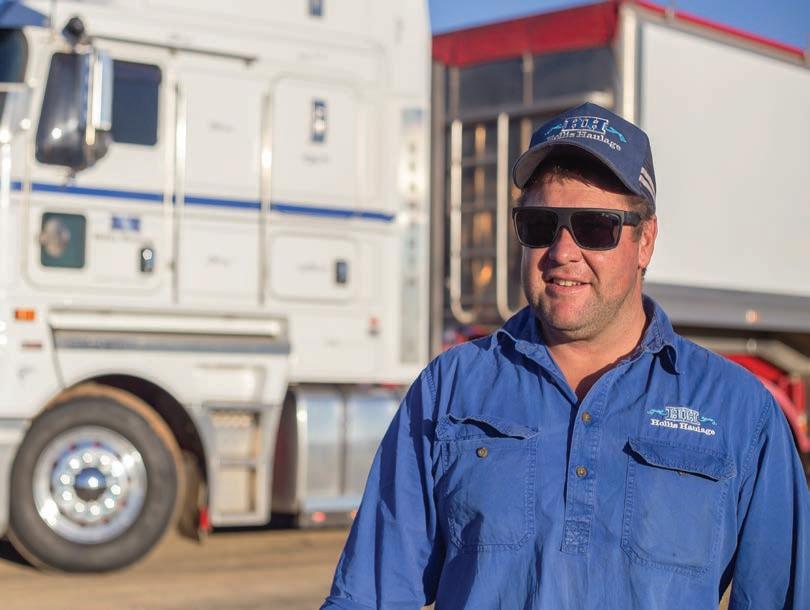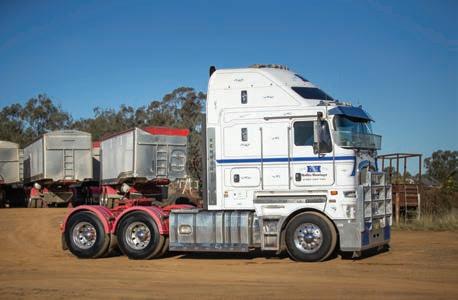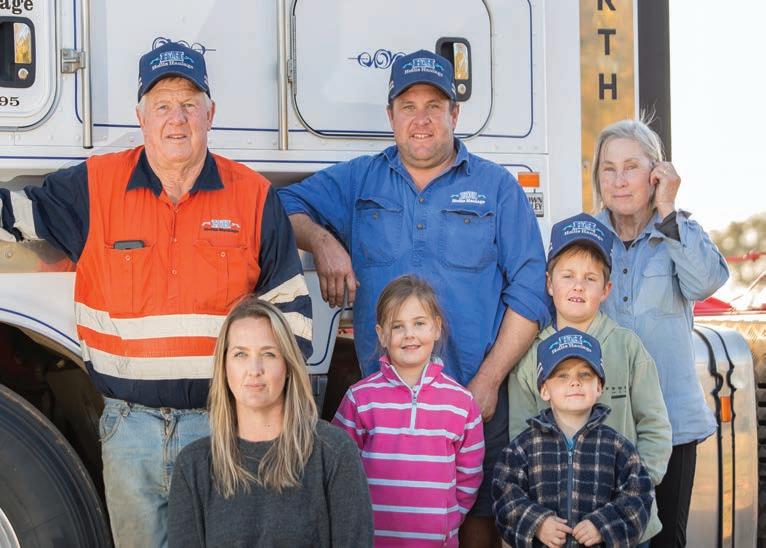
14 minute read
INGRAINED IN TRUCKING







Father and son: Gary and Luke Hollis

From a family history in transport, Gary Hollis and his son, Luke, have managed their way through the drought years by diversifying their Tamworth-based business. Warren Caves writes
AS FARMERS sow crops early in the season, they place their faith in the weather gods that sufficient rain will bring their plantings to a bountiful harvest later in the year. Mother Nature can be fickle and sometimes has other plans for the way she disperses the water rations.
With the exception of the last grain harvest season, the Tamworth and Gunnedah region in New South Wales, like most of the country, suffered from a crippling drought for three years or more. The long dry spell and absence of any meaningful rain, left water tanks empty and crops thirsty.
Tamworth-based family-run Hollis Haulage, with its business model based heavily in contract harvesting, faced challenges of significant magnitude as the entire rural economy slowed to a crawl.
Starting in 1983 from the family’s 100-acre, property ‘Cedar Hill’ just outside the country music capital, Gary and Bonnie Hollis set about building the foundations of what would eventually become Hollis Haulage. Bonnie worked (and still does) as a nurse, while Gary, as his father and grandfather did, set about making his mark in the transport industry.
“My grandfather started out in transport working bullock teams from Wauchope to Walcha on the south-eastern edge of the Northern Tablelands of NSW. Dad drove log trucks in the same area before moving to Tamworth to drive stock crates, so it must be in the blood a bit,” Gary explains.
In the early days, to supplement their small farm crop income, Gary would jump in his 345 cubic-inch V8 powered International ACCO to do a little bit of grain cartage work at harvest time for local growers. At harvest end, Gary and his trusty ACCO would cart spuds from the Niangala area, south-east of Tamworth, a bit of timber and any other work he could get his hands on for the truck.
Not one to sit idle, to keep the money coming in, Gary also worked in town at the Repco machine shop but, according to Bonnie, Gary just wanted to be his own boss.
As the years marched on a Bobcat was later purchased, along with a Volvo F10 tipper. This led to work for Gary cleaning out chook sheds and the like. A dog trailer was later added and a second,

newer, F10 Volvo bought to replace the first one, which had served its purpose.
The eventual purchase of a K100E Kenworth truck and dog tipper combination, affectionately known as ‘Rhythm and Blues’ and later the first header, would lead the business of Hollis Haulage to its current focus – contract harvesting and rural commodities transport.
As farm kids do, they learn from a very early age. It doesn’t matter how young you are, stuff needs to get done, and Gary and Bonnie’s three sons – Mathew, Tom and Luke – were no exception.
“They learnt very early on about machinery, that’s for sure,” Bonnie says.
“They learnt quickly how to fix things.”
As Gary recalls of the early days: “The boys would drive the header and I would drive the truck. It wouldn’t matter if we were harvesting our place or someone else’s, that’s how it got done”.
Maintenance costs
Life went on and the sons grew up and went in their different directions, with Luke Hollis opting for a stint in Western Australia working in his trade of auto electrician. Luke and his now-wife Chelsea spent six years in Port Hedland before the lure of a home-cooked meal drew them back to Tamworth.
Upon his return, Luke suggested to Gary that they should buy another truck. Gary still had (and still does have) ‘Rhythm and Blues’ as well as an International TranStar which was towing a tanker trailer carting tallow at that time.
Shortly thereafter, the pair bought a Kenworth K104 and a float trailer. Over the subsequent years, the business grew and grew, with the contract harvesting requiring more and more trucks to keep up with the headers and get the crops off the farms in a timely manner.
Luke admits that, by starting out with older gear, they realised the amount of time and associated costs with keeping the old equipment maintained and running was outweighing the cost to purchase newer, more reliable equipment.
I hear this time and time again from operators who have started out this way, however, hindsight is a wonderful thing and, when dollars are tight in the early days of starting any business, it takes a lot confidence (and cash or debt) to make the decision to buy new from the outset.
From the official formation of Hollis Haulage



Tough going





Top: Kenworth heavy: The Hollis Haulage fleet

Above: Luke Hollis spent six years in Port Hedland before returning to the country music capital in 2012, the truck fleet has now grown to seven trucks, four B-double sets, one A-double tipper set, four 45-foot (13.7m) drop decks, two B-double flat tops, a low loader and a tanker trailer. They also operate four of their own headers.
As the seasons do, they tend to run in cycles, and, as history now tells us, a drought was looming that would force Hollis Haulage to pivot its operations to alternate freight and make some tough business decisions.
According to Gary: “With the exception of the 2020 season, the last three years have been pretty dismal for harvest work. During the drought I had to do a lot of hay cartage.”
Bonnie adds: “One of our trucks operating as an AB-triple was constantly running grain from far southern NSW up into southern Queensland feedlots. They had no grain, there was a real shortage.
“We also carted a lot of grain into local feedlots that had been shipped into the Port of Newcastle from WA. It kind of runs in cycles; the trucks had some work, but the headers really didn’t.”
While the headers were sitting silent in the sheds, the trucks remained somewhat consistent, or as consistent as could be expected considering the prevailing climatic conditions.
“We do a lot of baled cotton work, which comes from irrigated farms so, that helped a fair bit during the drought,” Luke says.

Although there was some work for the company, undoubtedly things were tough. And with tough times come tough decisions. Faced with the possibility of putting off one of the three employee drivers due to a reduced workload, Luke made the selfless decision to return to his trade for 12 months, ensuring there was enough work to keep on all of the company’s drivers. “It was just too hard to put someone off who hadn’t done anything wrong,” Luke admits.
Conditions have since improved and Hollis Haulage seems to be back on track, keeping up with new innovations and higher productivity equipment.
“We have invested in hydraulic cotton bale trailers by Collier & Miller. These trailers allow round bales to be double stacked into the trailers’ raised hydraulic frame that, once the bales are loaded, descend down to partially crush the bales within the frame, eliminating the need to strap the bales and ensuring the load does not exceed height restrictions. We can get nine bales to a single trailer with this design,” Luke says.
“All our trucks run on HML [higher mass limits], under the IAP [intelligent access program]. We can run roadtrains into the outskirts of Tamworth near the airport and we are running our 26-metre A-double at 75.5-tonnes gross all the way into the Port of Newcastle. This combination yields us a payload of around 51-tonnes.
“We will evaluate the feasibility of adding a 30-metre combination if it is eventually approved for use on this route. We also have a new Kenworth T659 coming to replace our T409,” Luke adds.
All of the day-to-day running of the business is handled by family members, with Bonnie and Luke sharing the logistics and compliance aspects.
Luke says he likes the seasonal nature of the work, but finds it a little harder now that he has kids.
“Being away from home never used to bother me, it’s just a little tougher now.”





Top: Hollis Transport’s Kenworth T409 is soon to be replaced with a T659
Above: Three generation: (back row, from left) Gary, Luke and Bonnie; (front row, from left) Chelsea, Willa, Lochie and Fletcher Hollis
Toward the end of our chat out the back of Toyota ute, and amid the fading afternoon light and a chorus of squawking galahs, Gary hinted towards the desire to retire, although I’m not convinced he means it.
I do get the impression that Luke’s kids (Lochie, Willa and Fletcher – who have their names inscribed on the side of the company’s newest trucks) might just be willing to step up and take the batten from Gary when their ages permit. Although, as most country kids do, they’ll probably be driving around the farm just as soon as their feet can reach the pedals, cementing a five- generation transport legacy for the Hollis family.





NatRoad Warren Clark

Unintentional shortfall
Employers are facing constant state-based developments regarding so-called ‘wage theft’ laws
YOU’VE PROBABLY heard the term ‘wage theft’ coupled with talk of tougher penalties and criminalisation for employers who underpay their employees.
It is used by some politicians and unions to refer to employers who have underpaid their employees or failed to provide them with all their entitlements, either wilfully or because of errors. NatRoad rejects the term ‘wage theft’. It is a loaded term, with no legal basis, that leads to demands for tougher penalties and even the application of criminal penalties to employers who have underpaid their employees.
Put simply, so-called wage theft is the underpayment of employees.
Australia has a complex system of laws governing the payment of employees and compliance is challenging. So, when a series of large and presumably well-resourced employers, like Woolworths, have reported extensive miscalculations in the payment of wages and other entitlements, the difficulties small businesses face in ensuring compliance with workplace laws is even more stark.
NatRoad does not condone businesses underpaying their employees. But it is our experience in providing support to members that, where an underpayment has occurred, it is not a result of a deliberate decision to underpay. Whenever we have identified payment issues, they are caused by the complexity of the industrial relations system.
Heavy penalties apply where an employee, or group of employees, have been underpaid and these extend beyond significant fines to reputational damage and, increasingly, potential jail time. While these are offences against federal laws, both the Victorian and Queensland state governments have passed legislation that makes wage theft a criminal offence, with the Victorian legislation due to start on July 1, 2021.
Employers face on-the-spot infringement notices or they may be taken to court where the Fair Work Ombudsman (FWO) reasonably believes that the employer has contravened the record-keeping and pay slip obligations contained in the Fair Work Act 2009 and the Fair Work Regulations 2009, or breached the terms of a modern award.
Significantly higher penalties can apply for serious contraventions where a business or individual knew that they were contravening workplace law and they did so as part of a systematic pattern of conduct. These penalties can apply to breaches of modern awards or enterprise agreements, a national minimum wage order, the method and frequency of paying wages, record-keeping, payslip requirements and more. NatRoad does not support deliberate evasion of workplace laws and these penalties make sense, especially when compared with the so-called wage theft laws.
This is particularly underlined where an employer is found to have breached the Fair Work Act; a person involved in the contravention, such as a human resources manager, could also be personally liable and face a civil penalty of up to $13,320 per contravention. Despite these tough federal penalties, state jurisdictions have gone off on a frolic of their own.
PRACTICAL IMPLICATIONS
Now more than ever, employers need to get pays right. This means: 1. Ensure your staff are being paid correctly under the relevant modern award or enterprise agreement, keeping in mind pending changes to transport award minimum rates of pay from the first full pay period on or after July 1, 2021 2. Be sure to factor in allowances, overtime and other relevant award or enterprise agreement entitlements to ensure you are paying correctly under an award or enterprise agreement.
NatRoad advisors can give you confidential advice about whether you are paying wages in accordance with the relevant modern award or enterprise agreement.
WARREN CLARK, NatRoad’s chief executive officer, has more than 20 years’ experience leading and developing business for emerging companies. Warren has held the position of CEO at various companies and is a certified chartered accountant.
STATE LAWS
The Victorian parliament has passed Australia’s laws on wage theft, the Wage Theft Act 2020, which created a criminal offence for underpayment of employee wages and entitlements by employers. It also established the Wage Inspectorate Victoria agency with the authority to conduct investigations and bring criminal proceedings. The Inspectorate has extensive powers to enter premises to obtain information, seize evidence and execute search warrants.
Queensland has passed the Criminal Code and Other Legislation (Wage Theft) Amendment Act 2020, which amended the Queensland Criminal Code to change the definition of ‘stealing’. The definition of stealing now incorporates a failure to pay an employee an amount payable to them in relation to the performance of work.
In Western Australia, the Industrial
Relations Legislation Amendment Bill 2020 was introduced in response to the 2019 Inquiry into Wage Theft in Western Australia.
In South Australia, a Select Committee on Wage Theft released an interim report in July 2020. This interim report noted the high volume of submissions that were calling for the criminalisation of underpayment of wages. Legislation has not been introduced.
This means that employers may be investigated by the FWO or a state agency for the same potential contraventions. Previously, employer admissions and selfreporting to the FWO would not contribute to potential imprisonment. However, this is now a possibility under s tate legislation.
MOORE

Moore trailer for your money! TRAILERS



07 4693 1088 www.mooretrailers.com.au









